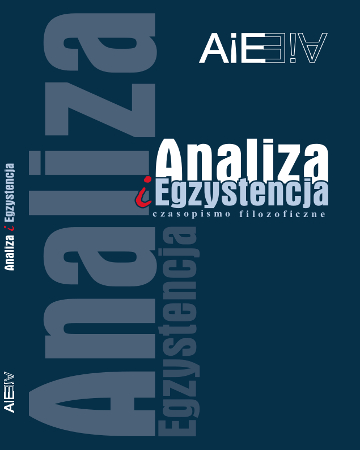
ISSN: 1734-9923
eISSN: 2300-7621
OAI
DOI: 10.18276/aie.2016.35-01






Lista wydań /
35 (2016)
Shaftesbury as Popperian: critical rationalism before its time? Part I
| Autorzy: |
Lydia
Amir
College of Management Academic Studies, Rishon LeZion, Israel |
| Słowa kluczowe: | humor, critical rationalism, Shaftesbury |
| Data publikacji całości: | 2016 |
| Liczba stron: | 17 (5-21) |
Abstrakt
Shaftesbury has assigned humor an unparalleled role within philosophy, which maybe encapsulated in the following tenets: (1) ridicule is the test of truth; (2) humor andgood humor have a habilitating function with regard to truth; (3) the most effectivecriticism is humorous; and (4) humor is the mark of rationality. In the present article,I introduce Shaftesbury’s views on ridicule, good humor and humor in order to assessboth the originality and viability of Shaftesbury’s contribution. I argue, first, thatShaftesbury’s views on ridicule as a test of truth and on good-humor as habilitatingtruth are thoroughly original, but cannot be implemented without adhering to hismetaphysics and epistemology. Second, Shaftesbury’s views on humor are only partiallyoriginal, though these can be implemented independently of metaphysical andepistemological assumptions for the greatest benefit of philosophers in general andcritical rationalists in particular. I conclude that not only does Shaftesbury anticipatethe view that critical thinking is the core of rationality, the main principle of the viewknown as critical rationalism associated with the renown 20th century philosopherof science and social philosopher, Karl Popper, but he also offers a viable meansto enhance criticism as rationality by taking into consideration the psychologicalresistance to criticism that Popper acknowledges but refuses to address.
Pobierz plik
Plik artykułu
Bibliografia
| 1. | Blanshard, B. (1980). Selections from On Philosophical Style. In: Philosophical Style (p. 123–143). Berel Lang. |
| 2. | Cassirer, E. (1953). The Platonic Renaissance in England. Trans. J.P. Pettegrove.Edinburgh: Thomas Nelson and Sons. |
| 3. | Cazamien, M.L. (1952). The Development of English Humor. Trans. R. Guyonnet.Durham: Duke University Press. |
| 4. | Hark, M. ter. ( 2004a). Popper, Otto Selz, and the Rise of Evolutionary Epistemology. Cambridge: Cambridge University Press. |
| 5. | Hark, M. ter (2004b). The Psychology of Thinking, Animal Psychology, and the Young Karl Popper. Journal of the History of the Behavioral Sciences, 40 (4), 375–393. |
| 6. | Horace (1959). The Satires and Epistles of Horace. Chicago, IL: University of Chicago Press. |
| 7. | Keut, H. (2005). The Philosophy of Karl Popper. Cambridge: Cambridge University Press. |
| 8. | Klein, L.E. (1994). Shaftesbury and the Culture of Politics. Cambridge: Cambridge University Press. |
| 9. | Larthomas, J.-P. (1986). Humour et enthusiasme chez Lord Shaftesbury (1671–1713). Archives de philosophie, 49, 355–373. |
| 10. | Popper, K.R. (1927). “Gewohnheit” und “Gesetzerlebnis”. In: Der Erziehung: Eine pädagogisch-strukturpsychologische Monographie. Hoover Institute Archives. Karl Popper Papers, box 12, file 11. |
| 11. | Popper, K.R. (1959). The Logic of Scientific Discovery. London: Hutchins. |
| 12. | Popper, K.R. (1961). The Poverty of Historicism. London: Routledge and Kegan Paul. |
| 13. | Popper, K.R. (1962). The Open Society and Its Enemies. 2 vols. London: Routledge and Kegan Paul. |
| 14. | Popper, K.R. (1963). Conjectures and Refutations: The Growth of Scientific Knowledge.London: Routledge and Kegan Paul [5th revised edition, 1989]. |
| 15. | Popper, K.R. (1974). Intellectual Autobiography. In: The Philosophy of Karl Popper (The Library of Living Philosophers, vol. 15), Books I and II, Paul A. Schilpp (ed.). Vol. 2 (p. 961–1197). La Salle, IL: Open Court. |
| 16. | Popper, K.R. (1994). The Myth of the Framework. London: Routledge. |
| 17. | Shaftesbury, A.A.C. (1963 [1900]). Characteristics of Men, Manners, Opinions, Times, etc., Gloucerster, MA: Peter Smith. |
| 18. | Shaftesbury, A.A.C. (1837). Characteristics of Men, Manners, Opinions, Times, etc., 6th edition, 3 vols, corrected. London: James Purser. |
| 19. | Shaftesbury, A.A.C. (1992 [1900]). The Life, Unpublished Letters, and Philosophical Regimen of Anthony, Earl of Shaftesbury, London: Swan Sonnenschein and New York: Macmillan. |
| 20. | Shaftesbury, A.A.C. (1698–1712). Askêmata, two notebooks. The Shaftesbury Papers in the Public Record Office in London (P.R.O.) 30/24/27/10. |
| 21. | Shaftesbury, A.A.C. (1706). Pathologia sive Explicatio Affectum Humanorum. The Shaftesbury Papers in the Public Record Office in London (P.R.O. 30/24/26/7.) |
| 22. | Smith, H. (2001). The Meaning of Life in the World’s Religions. In: J. Runzo, N. Martin (eds.), The Meaning of Life in the World Religions (p. 255–268). Oxford: Oneworld. |